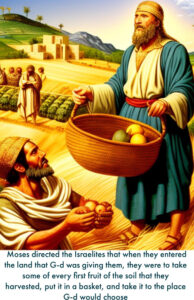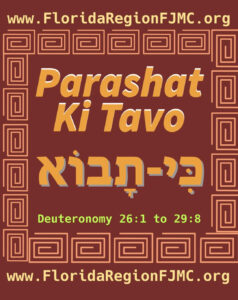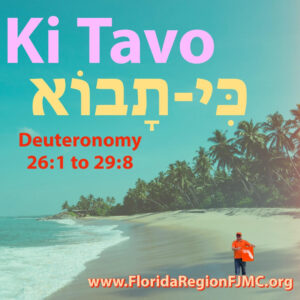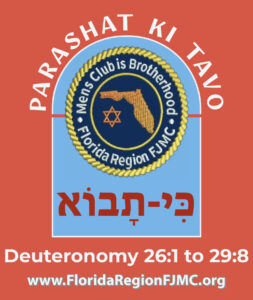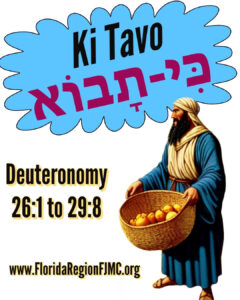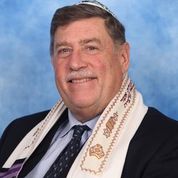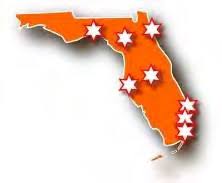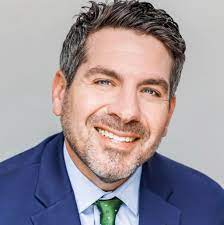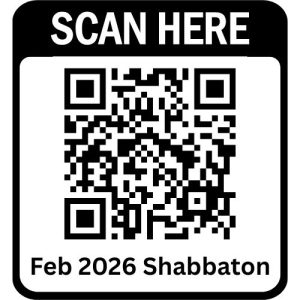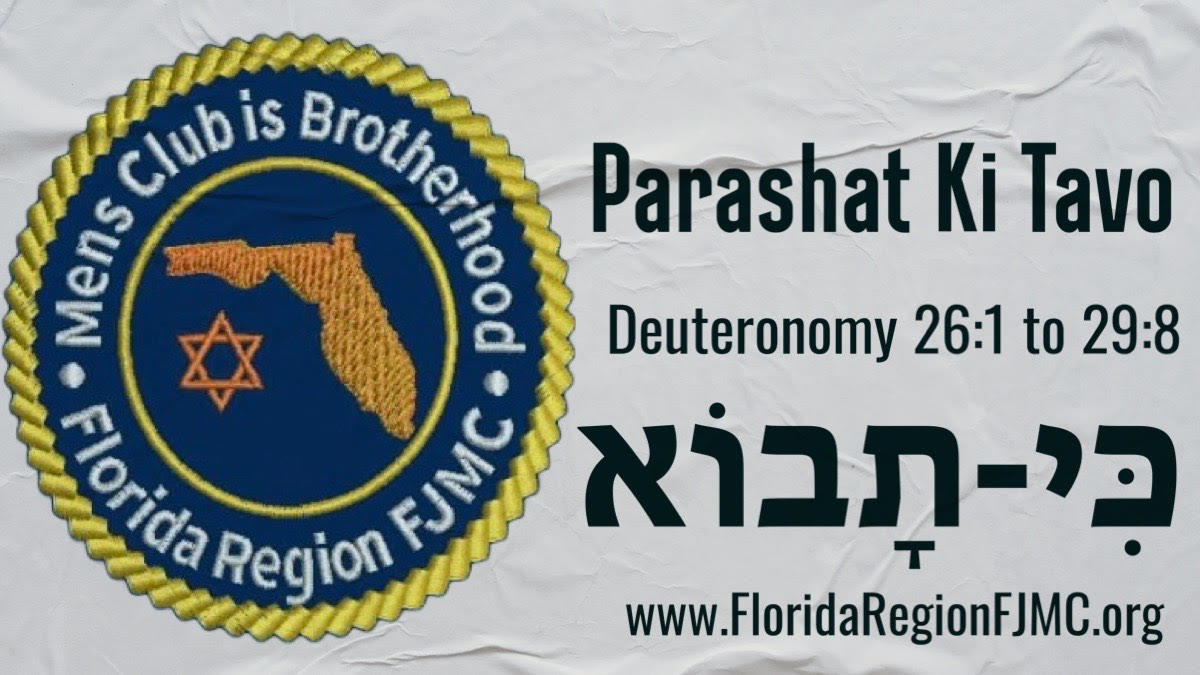
When you Choose Shabbat, you choose to learn that every Shabbat is different and special. This week I learned about Parashat Ki Tavo (כִּי-תָבוֹא), the 50th weekly Torah portion in the annual cycle of Torah readings.
According to Wikipedia, Ki Tavo (כִּי-תָבוֹא), Deuteronomy 26:1 through 29:8, contains 6,811 Hebrew letters, 1,747 words, 122 verses and makes up 261 lines of the Torah scroll. Ki Tavo includes a discussion of the ceremony of the first fruits, bikkurim (בִּכּוּרִים), the law of tithes and a list of blessings for observance of the law and and curses for violation of the law..
Rabbi Michael D Klein of Temple Torat Emet offers his insights on this week’s Torah reading, Ki Tavo:
“What if , every time we made a choice the results of our choice could produce instantaneous results? We could receive immediate feedback to determine if our choices had good or bad consequences. In the real world, this seldom occurs. Most of the time, our choices set in motion effects which may take hours, days, and even years to transpire.
Does it not make sense, that the more information we have available, the better chance we have of making choices that increase the chances immediate and future positive results? Plus, we often are not aware, until a much later time that the choices in speech and action also have ripple effects which we cannot foresee.
The Torah portion of Ki Tavo emphasizes these ideas by placing before us the scenario of events which might occur as the result of the mindfulness of what we say and do. On the one hand, the Sedra enumerates the myriad blessings available to us which are the results of loving and revering G-d and following with all our heart and soul the ways of Torah. However, also contained within are the horrifying possibilities of curses and warnings which can transpire as the result of individually and nationally pursuing a life of idolatry, immorality, and injustice.
Why are there so many more warnings and curses than blessings enumerated? Perhaps, as many sages have suggested, it is the same reason there are so many more of the 613 mitzvot that are don’t do than do!
G-d realizes that the temptation of bad choices are much stronger than the will to do good. Therefore, if we are faced with the consequences of making bad choices, then perhaps we will instead choose to follow our good inclination (Yetzer Tov) rather than our bad inclination (Yetzer Hara), or at least use the energy from the Yetzer Hara and turn it into good, positive energy as a force for good. This is also why we seek G-d’s guidance and study the Torah so that we realize what G-d’s expectations are to help guide us toward a meaningful life of Torah and Mitzvot.
May G-d give us the strength to always seek out a life of good deeds and following our Yetzer Tov to give us courage to face the daily challenges of life!
Questions to Ponder:
- When do we usually perform the ceremony of bringing a basket of first fruits ? How do we know that this is performed in every generation?
- Why is the Tochecha (warnings) so expanded from previous Torah Portions (Bechukotai)?
- We are told to build an altar of sacrifice on Mt. Ebal. Why was this mountain chosen?
- What are the 3 main preventive reasons given for the warnings?“
Rabbi Michael D. Klein attended Yeshiva College of South Florida and served as Torah Reader, Hebrew teacher, Chazzan and spiritual leader of various synagogues throughout South Florida. In January 2015 he became Ritual Director, Bnai/Bnot Mitzvah instructor and 7th grade Hebrew instructor for Temple Torat Emet of Boynton Beach. In October 2019 he was accepted into an accelerated track and received his shicha from Yeshiva Adath Wolkowisk and has been the Rabbinic leadership of Temple Torat Emet since August 2020. In September of 2022 he was appointed Rabbinic and Spiritual Advisor of the Florida Region of FJMC.
Choose Shabbat; choose to celebrate, to light candles, sing songs and learn a little Torah.
This moment of Jewish Learning is brought to you by the Florida Region of the Federation of Jewish Men’s Clubs (FJMC). We are part of a confederation of over 200 Jewish Men’s Clubs and Brotherhoods representing over 20,000 members across the United States, Canada, Latin America, and beyond. Learn more about how your Jewish Men’s Club or Brotherhood can affiliate with the FJMC at: https://www.fjmc.org/content/affiliating-fjmc.
The Florida Region of FJMC serves the needs of affiliated Men’s Clubs and Brotherhoods throughout the State of Florida. Get to know more about the FJMC Florida Region and our growing network of Jewish Men’s Clubs and Brotherhoods at www.floridaregionfjmc.org and please visit and LIKE our Florida Region FJMC Facebook Group at www.facebook.com/FloridaRegionFJMC.
